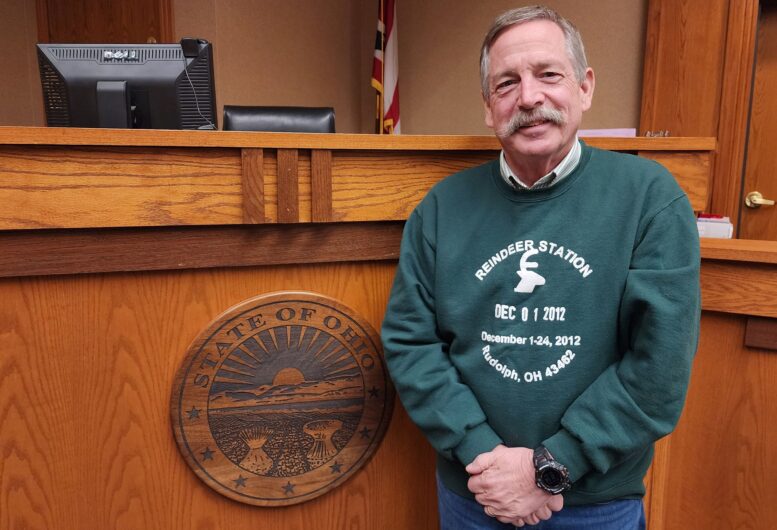By JAN McLAUGHLIN
BG Independent News
As Judge Mark Reddin walked through the hallway to his courtroom, he paused at the closet holding a couple well-worn items.
“I’m about done with ties,” he said. And that includes two cut-out dress shirt collars with ties – one a clip on for extra ease. A court employee created the “judicial dickies” for Reddin so he could maintain an official appearance to all those in court, while wearing a T-shirt and Bermuda shorts underneath his somber black robe, the judge said with a grin.
Reddin’s reputation
After 29 years on the bench at Bowling Green Municipal Court, no one should mistake Reddin’s humor for a lack of seriousness. As he retires this week, the judge leaves with a reputation of being tough-minded and fair.
And he leaves behind a pink painted office – which his replacement Alyssa Blackburn-Dolan plans to replace with a nice eggshell white.
As the sole judge at the municipal court, Reddin handled thousands of cases each year – as many as 17,700 during the busiest year. He knew his role.
“My responsibility is fidelity to the law and the Constitution,” he said. “To be fair and impartial to all who appear before me.”
Reddin saw many “frequent flyers” in his courtroom, and his goal was to close the “revolving door” of repeat offenders.
“I would try to reach them so they didn’t keep coming back.” To do that, he sometimes lowered his lofty judicial language to more plain talk. As an example, Reddin told a driver with multiple speeding violations that if he were to show up in his courtroom again, the judge was “going to make it hurt.” That worked, and led the motorist to let up on the gas.
“We’re in the behavior correction business,” Reddin said.
Family tradition
Some might say that Reddin was born to be an attorney. But he didn’t know that until he earned a teaching degree in social studies. There were few teaching jobs available, so he considered his options.
The answer was found in his family tree. His parents, Evelyn Bliss and Daniel W. Reddin III, were both attorneys, as were his grandparents, Rosina Black and Daniel W. Reddin Jr.
His grandparents met in Japan, where Rosina was a missionary in the 1920s and Daniel worked for the Akron Rubber Co. It was his grandmother’s idea that she and her husband should go to law school.
With their law degrees in hand, they moved to North Baltimore and opened a law office.
Decades later, Evelyn and Daniel Reddin met at Oberlin College, and practiced law in Bowling Green. They were recognized for their keen minds and commitment to the community.
At home, Evelyn and Daniel raised five children, never pushing any of them to pursue the family’s legal tradition.
“My parents were cognizant not to direct their children on what to do,” Mark Reddin said.
As he studied civil and criminal procedures, Reddin acknowledged he knew little of the profession. He had never accompanied his parents to court, with his only court appearance occurring after his dog was found running loose.
Upon earning his law degree, Reddin went into private practice, plus provided legal counsel for several municipalities in Wood County.
Running for judge
In 1995, with the retirement of Judge James Bachman, Reddin decided to run for the elected position of Bowling Green Municipal Court judge.
A novice at the election process, Reddin faced off against another novice, Tom Vogtsberger. Reddin still recalls the two of them having a friendly conversation about their discomfort going before the electorate.
The judge still has the scrap of paper in his desk that fellow Republican Mike Sibbersen passed to him on that first election night, showing the vote tally of 6,889 to 5,987 in Reddin’s favor.
That was the last time that anyone challenged Reddin for his judgeship, leading to the longest serving stint in the municipal court seat.
College town
The large caseload for the municipal court is largely due to the university student population. Underage consumption has been the “bread and butter” of the court, though it is a lesser charge with lower penalties than when Reddin began. Misdemeanors of the first degree, with sentences up to six months and fines up to $1,000, are the most serious cases handled by municipal courts.
Domestic violence cases are also among the more frequent charges in the court, with this time of year, during the holidays being “a high time for that activity,” the judge said.
And operating a vehicle under the influence rounds out the top three types of cases heard by Reddin.
Since he took over for Bachman, a new courthouse was constructed on South Dunbridge Road, meaning court was no longer called into session in the makeshift courtroom in the city’s public works garage facility.
When Reddin became judge in 1995, the court handled 12,500 cases. The caseload “ballooned” over the years, reaching a high of 17,700 cases in 2005.
“We were jamming. We were busy. I like being busy,” the judge said.
But since then cases have dropped off, with 13,600 this year. Several factors have contributed to that, even something as simple as the widening of Interstate 75 that leaves little room for state troopers to sit to catch speeders between Bowling Green and Findlay, Reddin said.
Big cases
Top of the list of cases Reddin won’t ever forget is the OVI charge against a sitting state justice. During Reddin’s second year on the bench, Justice Alice Robie Resnick was stopped for suspected OVI when she pulled off for gas in Bowling Green. She then reportedly drove off without the consent of police officers. She was stopped by state patrol a mile or two down I-75.
“You don’t forget something like that,” Reddin said.
The court was swamped by national media, suspicious of how the high profile case might be handled. But Reddin made the process open to the public.
Resnick was found guilty of drunken driving and driving outside marked lanes by Reddin. He sentenced her to three days in the Wood County jail or in the alcohol treatment program offered at Nazareth Hall. He suspended her driver’s license for six months and placed her on probation for two years.
Then there was the city’s passage of nuisance party legislation. The ordinance was challenged by student legal services, but Reddin ruled that the law was not unconstitutional. The appeals court agreed.
One robe, many roles
Over the years, Reddin has learned that being the lone judge brings many responsibilities, including building maintenance and human resources.
It also helps to practice some social work.
“We do have a responsibility for people’s lives,” and that means connecting them with social services, rehabilitation and mental health services.
For many years, the county jail was a de facto mental health facility.
“Jail is not a mental health facility – but often there was no place to put them,” he said.
Reddin has seen that change, with substance abuse and mental health services now offering inpatient treatment that was so needed.
After sitting on the bench for nearly three decades, Reddin is ready to not be on call 24/7. He won’t miss the 3 a.m. calls from police officers seeking search warrants to take blood samples from suspected drunk drivers.
He won’t miss his behavior being under a microscope when he is in public. And he may even start eating at local restaurants again – a practice he stopped since he never knew if those preparing the food may have recently come before him in court.
What’s ahead?
Reddin is keeping an open mind about his future. He has dreams of traveling with his wife, Deb, who retired almost two years ago after teaching more than 20 years at the Montessori School in Bowling Green.
They are thinking of Panama, Thailand, Argentina, Italy, Mexico, and driving the Alaska Highway.
Reddin suspects he will miss his staff and attorneys the most after he retires.
“You don’t do this job without having a lot of people helping,” he said. “It’s been a good career.”
And who knows, he has the option of working part-time as an assigned judge.
“If I miss it enough, I can come back,” he said with a smile. Maybe he should hang onto the cutout collar and clip-on tie – just in case.


